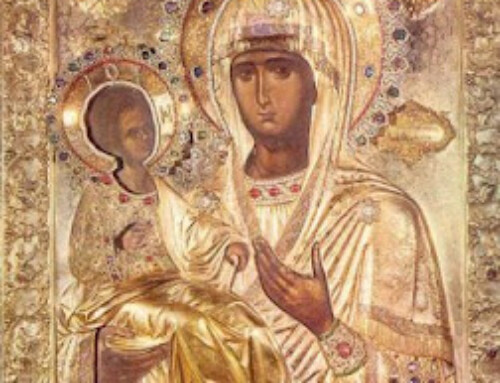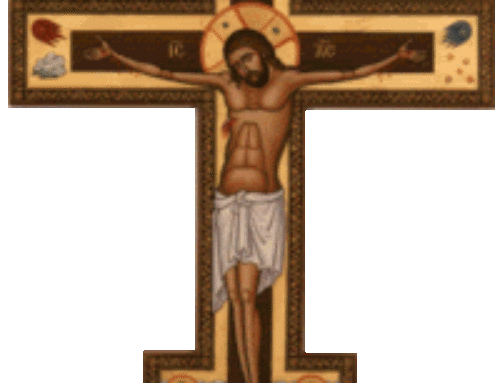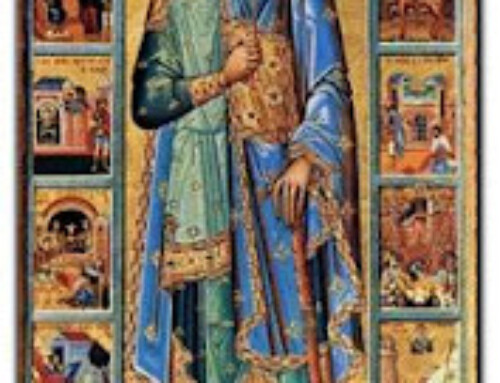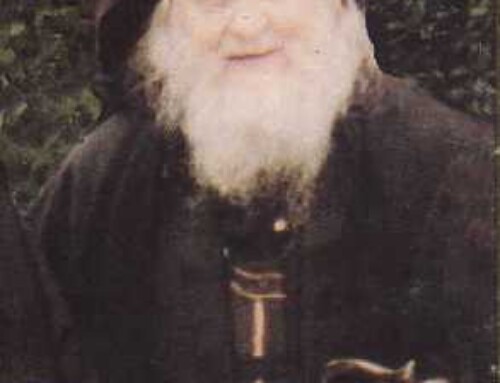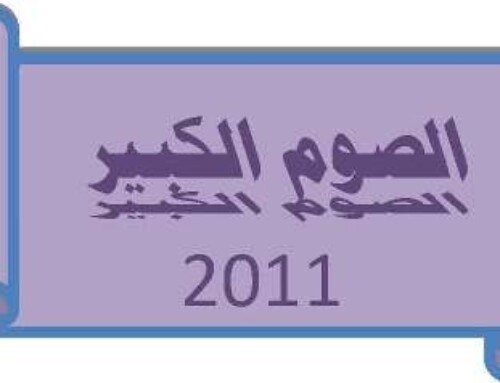Word Magazine December 1963 Page 9-10
LANGUAGE OF THE LITURGY
By Clifford T. Argue
President Orthodox Christian Fellowship of Cornell University
“For if I pray in an unknown tongue, my spirit prayeth, but
my understanding is unfruitful.” I. CORINTHIANS 14:14
These words written by St. Paul almost 2000 years ago, also represent the feeling of a growing number of Greek Orthodox Christians in America today. They are second and third generation young people who are growing up, away from the traditional big city Greek ghettoes of the 20’s and 30’s, in the thousands of suburbs surrounding our cities where assimilation with other nationalities is almost complete. As a result these young people have only limited, if any, knowledge of the Greek language.
The Greek Orthodox Church in America, however, continues to insist that only the Greek language may be used in the Divine Liturgy and other services, although permission has been granted for priests to give sermons in English. Because of this policy, the Church is faced with the potential loss of some of its life-blood new young members — because their understanding of the Greek-language liturgy is “unfruitful.” For many it is not enough to merely follow along in a service-translation book, and they are leaving the Greek Church to become members of various Protestant denominations.
Among the major Orthodox communions in America, the Greek Orthodox Church is the only one which does not allow its priests to use English in services. The Russian and Syrian Orthodox groups have had much success with the use of English language liturgies, and in those churches which offer two liturgies on Sundays, the attendance at the English service is usually greater than at the foreign language service. Priests of these parishes also point out that a large number of older people often attend the English service. Some Greek priests are using English in such areas as weddings and baptisms, a practice which has been enthusiastically received by the parties
involved, but one which is totally against the stated directives of the hierarchy.
Historically, there is much precedent for the use of the vernacular in the liturgy of the Eastern Orthodox Church. Father John Meyendorff, in his recent authoritative work on the Orthodox Churches notes, “The Byzantine method of spreading the Gospel involved translating both the Scriptures and the liturgy in the language spoken by the people of the country and then establishing new churches modeled in all respects on the ‘Great Church’ at Constantinople.”1 On the other hand, Father Meyendorff relates that the Roman missionaries oftentimes ran into trouble in trying to force Latin upon converts, and some popes later “acknowledged the justice of the Greek point of view with regards to the use of native languages in the liturgy.”2
This year marks the 1100th anniversary of the beginning of the conversion of the Slavic people to Christianity by the Greek Orthodox Church through the use of the vernacular. In the year 863, two young Greek brothers from Thessalonica, Constantine, later known as Cyril, and Methodius left Byzantium on a mission to take the Orthodox faith to the Slavs. In order to do this, they had to take the almost illiterate language then in use by the Slavs, invent an alphabet to fit it, and then translate the Gospels and liturgies into this language. The language, today known as Old Church Slavonic, brought not only religion, but a large measure of culture to the Bulgarians, Russians, and Serbs who made up the large part of the Slavic world. As one author notes, “The translation of the liturgical offices into a vernacular language was, from the Byzantine point of view, natural and legitimate. Constantine himself, when later defending the Slavonic liturgy against its detractors in Venice, cited the example of many nations of Eastern Christendom who praised God in their native languages: among them were the Armenians, Persians, the Egyptians, the Georgians, and the Arabs.”3 So as Orthodoxy spread it was not the Greek language that was the bond among Orthodox peoples, but it was the common liturgy, described by the late English Byzantinist Norman Baynes as “. . . the liturgy in the vernacular tongue which was the gift of Byzantium.”4 Constantine and Methodius were later made saints by both the Eastern and Roman Churches in recognition of their work.
The history of Orthodoxy in America is of course not one of missionary activity, but of the immigration of people who brought their religion and language with them. However, as the time passes and each generation becomes farther removed from the old world life, the Church must in a sense put forth a missionary effort to keep the young people. No missionary attempt can hope to succeed by using a foreign language. The program of afternoon “Greek Schools” to teach youngsters the Greek language is not yielding results in proportion to the large sums of money being spent on it. Generally, attendance at these classes is only fair, when compared to the total potential enrollment, and the fact that the sessions are held following a full day of regular school classes does not make for much academic desire among the students. The vast majority of young people of Greek descent will therefore probably never learn Greek well enough so that their understanding of the services can reach any meaningful degree.
It is unfortunate that the official policy of the Greek Orthodox Church of North and South America remains completely opposed to any introduction of English in the Church except for sermons. The Reverend George Mastrantonis, a noted spokesman for Greek Orthodoxy in the United States through his informative OLOGOS pamphlets, points out that “The use of the Greek language is not a dogmatical decree or canon; it is rather a custom which can be changed in time through proper channels.”5 There appears to be a growing feeling among some Greek priests and laymen that the Church will have to change this “custom” in the next few years or risk giant losses in membership. Most priests are cautious in their discussion of the language question, fearful of censure by the Archdiocese, or perhaps loss of a comfortable job, and some will even privately agree yet publicly deny they are in favor of a switch to English. On the other hand, some are taking bold steps forward, openly violating the rules of the Archdiocese, and using English in the sacraments of marriage and baptism, sometimes even in the liturgies. The acceptance by laymen of this clandestine introduction of English services has been surprisingly favorable. The people seem to enjoy hearing their native language coming from the altar, and usually urge the priest to use more English. Reaction from the Archdiocese has been strangely silent. As one Greek priest in a large Eastern city who uses English regularly described it, “They know what we are doing up here, but because of the success they haven’t tried to stop it. 6
One important spur to the introduction of English which is receiving much attention these days is the drive for a unified “American Orthodox Church.” Archbishop Iakovos predicted recently that within fifteen years the various national Orthodox Churches in the United States will merge into a single unit, because, “By that time 95% of the people in these communions will be of American birth.”7 Preliminary planning towards this end is already under way in the Standing Conference of Canonical Orthodox Bishops of which Archbishop Iakovos is chairman and through joint conferences of the various youth organizations. But one question remains, and that is what language will be used in the Divine Liturgy of the American Orthodox Church? Surely, the hierarchy does not expect that the tens of thousands of people of Russian, Syrian, Bulgarian and other backgrounds are going to participate in services conducted in Greek. There is some small recognition of this fact by allowing Greek priests serving as chaplains in the Armed Forces and on college campuses, incorporating Orthodox of many national backgrounds, to conduct the Divine Liturgy and other services in English. But the priests who are serving the parishes across the country are officially denied the right to make the Word more meaningful to their congregations.
Some of the objections voiced against the introduction of English are legitimate to a degree, but not insurmountable. The lack of a completely accurate English translation bothers many serious theologians who feel the true meaning of the original Greek text does not come through. But just as Saints Cyril and Methodius translated the Holy writings carefully into the vernacular of their time, so can modern day scholars patiently change the Greek, Slavonic, and Arabic texts, word for word, idea for idea, into a usable and meaningful English. The loss of the beauty of the tones and chants when sung in harsh English is another realistic, yet minor problem, and the work of Byzantine musicologists who have already begun to make English services sound like those performed in old world cathedrals can be utilized as a stepping stone to even greater musical adaptation. And as one leading Greek Orthodox layman put it, “In the final analysis, we must be prepared to give up a small measure of beauty, to keep the youth within the Church.”8
The fear of alienation of the homeland, including loss of financial support to the Patriarch of Constantinople from the government of Greece is another often cited reason for the reluctance to change. However, even Greek men of letters and leading clergymen advocate the use of English by the Church in America. Professor H. Alivizatos, a member of the Greek Academy and professor of Canon Law at the University of Athens writes “The language of Americans of Greek descent is the English language, and according to the views of the Orthodox Church, it can be used in the liturgy. This is the only means by which their interest towards Orthodoxy will be maintained. The future of the Church, if these conditions are fulfilled, will be truly great and glorious.”9 In a similar vein, an article by Archimandrite Jerome Kotsonis, Chaplain of the Royal Palace of Greece and a professor at the University of Thessalonica stated, “The problem of survival of Hellenism in America is essentially a problem of preserving its Orthodoxy. The liturgical and sacramental wealth of our Church must become accessible through the performing of the Divine Liturgy and the other Holy sacraments and services in the English language, alongside of the Greek…The use of local language in both liturgy and preaching belongs to the Tradition of our Church . . . ”10
It is time that the Greek Orthodox Church in America begins to make the inevitable transition to a use of the English language. God understands all languages, and does not place a priority on Greek. Christ commanded that His apostles go forth and speak with new tongues, and St. Paul echoed this again in his First Epistle to the Corinthians (14:19) by saying, “In offering my prayer to God, I had rather speak five words that all my brethren will understand than ten thousand words in an unknown tongue. ”
REFERENCES
1. Father John Meyendorff, The Orthodox Church, New York, 1962, p. 61.
2 . Ibid. p. 51.
3. Dimitri Obolensky, “Apostles of the Slavs,” St. Vladimir’s Seminary Quarterly, Vol. 7, No. 1, 1963.
4. N. H. Baynes, Byzantine Studies and Other Essays, London, 1955, pp. 21-22.
5. Personal Communication, June 27, 1961.
6. Personal Interview.
7. Report of press conference, Washington Evening Star, April 24, 1962, p. 7.
8. Personal Interview.
9. H. Alivizatos, The Greek Orthodox Church, Athens, 1955, p. 6-9.
10.Rev. Jerome Kotsonis, Anaplasis, November, 1955, pp. 507-509 as quoted in St. Vladimir’s Seminary Quarterly Vol. 5, No. 1, 1961, p. 117.

